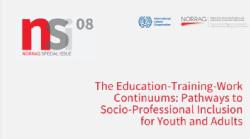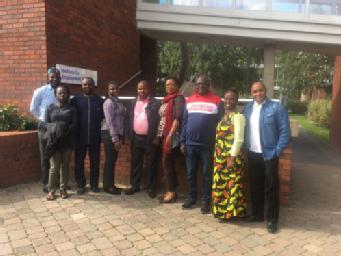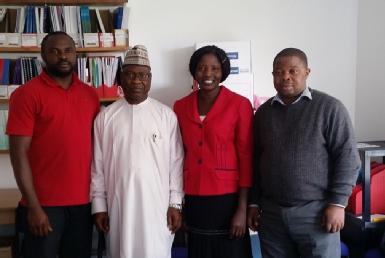IER News & blogs
Disconnection in the education-training-work-continuum
 Dr Jamelia Harris published an article as part of the NORRAG Special Issue NSI 08 : The Education-Training-Work Continuums: Pathways to SocioProfessional Inclusion for Youth and Adults.
Dr Jamelia Harris published an article as part of the NORRAG Special Issue NSI 08 : The Education-Training-Work Continuums: Pathways to SocioProfessional Inclusion for Youth and Adults.
The Special Issue is part of a collaboration with the ILO and focuses on the discontinuities that currently exist between education, training and decent work, arguing that existing discontinuities between these three fields create and reinforce exclusions and inequalities for already marginalised groups.
New cohort of Nigerian officials visit IER for training
 In September IER hosted a second cohort of labour market officials from the Nigerian Government’s Industrial Training Fund. The visitors receive training in the labour market data and analysis techniques developed by IER, covering: higher and vocational education; labour market classification, measurement and forecasting; and careers guidance and labour market information for all. The aim is to help build greater capacity in labour market analysis in Nigeria as the country seeks to diversify its economic base.
In September IER hosted a second cohort of labour market officials from the Nigerian Government’s Industrial Training Fund. The visitors receive training in the labour market data and analysis techniques developed by IER, covering: higher and vocational education; labour market classification, measurement and forecasting; and careers guidance and labour market information for all. The aim is to help build greater capacity in labour market analysis in Nigeria as the country seeks to diversify its economic base.
Mapping transferable skills
 IER has been commissioned by the Department for Education to undertake a mapping and analysis of transferable skills (such as, team working and communication) across each of the new Technical Routes proposed in the Sainsbury Panel Report and adopted in the Government's Post-16 Skills Plan.
IER has been commissioned by the Department for Education to undertake a mapping and analysis of transferable skills (such as, team working and communication) across each of the new Technical Routes proposed in the Sainsbury Panel Report and adopted in the Government's Post-16 Skills Plan.
The purpose of the study is the creation of a framework to help design the content of the new technical level qualifications.
Whilst there is much evidence on transferable skills in general, or graduate transferable skills in particular, relatively little research is available for 16-18 year olds who will be the main cohort undertaking the 15 Technical Routes. IER is taking an innovative approach, triangulating information and data from: an evidence review; occupational skills, knowledge and abilities from the O*Net database, and; transferable skills identified in apprenticeship frameworks and standards. To find out more contact Peter Dickinson.
IER delivers labour market analysis training for Nigerian Government agency

IER has been commissioned by the Nigerian Government’s Industrial Training Fund (ITF) to provide training to its staff to help them develop labour market analysis in Nigeria.
The Nigerian Government wants to broaden its economic base. Currently there are gaps in labour market information and capacity to develop that information. The ITF approached IER to provide training to enable them to establish better and more policy-orientated employment research. IER hosted 5 visitors from the ITF over June and July 2017 including the Director General of the ITF, Sir Joseph Ari.
IER staff delivered training modules on: labour market assessment and forecasting; vocational education and training, including apprenticeships; higher education and the graduate labour market; labour market classification and measurement; careers guidance and labour market information (LMI) for all. Returning to Nigeria, the participants will now cascade this knowledge base across the ITF.
Regarded as a success by Sir Joseph Ari, IER will now work with the ITF to expand the training programme over the rest of this year and into 2018.
Investing in adult education: health and well-being benefits

The APPG for Adult Education commissioned the Warwick Institute for Employment Research in 2016 to conduct research into the needs of adult learners. This work was supported by the Institutes for Adult Learning (IALs). The nine Specialist Designated Institutions (SDIs), including City Lit, Morley College, Hillcroft College, Northern College, Ruskin College, Working Men’s College, Mary Ward Centre, Fircroft College and the Workers’ Educational Association (WEA),– each has its own identity, mission and distinctive approach, which adds to the rich diversity of adult education.
Our primary focus was on adult education, and on adults returning to learn. Learning can occur in education or training institutions (offline or online), the workplace (on or off the job), the family, or cultural and especially, community settings. Findings from this in-depth study highlighted local and newly Combined Authorities will be accountable for the allocation of funds with Local Enterprise Partnerships (LEPs) in setting the agenda and identifying priorities within local communities. It is, therefore, critical that the contribution of adult education, including its contribution to improving health and well-being (which are pre-requisites for progression into and within employment), must not be lost or forgotten within current and any new devolution arrangements.
It is clear that most providers of adult education have invested in reaching out to people who are disadvantaged one way or the other. Many of whom would not otherwise know about adult education and what it could do for people in their circumstances. Adult education providers have developed the expertise, teaching skills and resources to deliver non-qualification provision and/or bite-sized units that successfully engage these adults in learning again, offering a stepping stone to success. Therefore, any policy or practical interventions need to reflect this and provide flexibility. Post-devolution, local Skills Commissioners will be required to make investment decisions - which is why their role is so central to the sustainability of adult education now and in the future.
IER'’s formal ‘Call for Evidence’ in 2017 has a distinctive focus on adult education, health and well-being. The main purpose is to gather the views of key stakeholders, partners and providers on the contribution of adult education to health and wellbeing outcomes. We have deliberately not attempted to define the parameters of the Call For Evidence too tightly as we want respondents to explore many different aspects of health and wellbeing. We hope to hear from those interested in any aspect of physical or mental health, including health and wellbeing in the context of age, disability, ethnicity, gender and location. For further information contact: Dr Deirdre Hughes OBE, deirdre.hughes@warwick.ac.uk.
